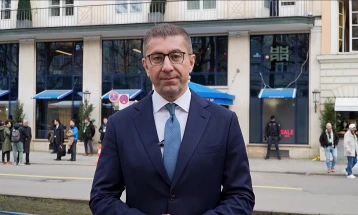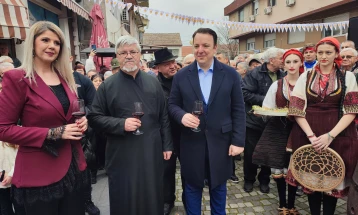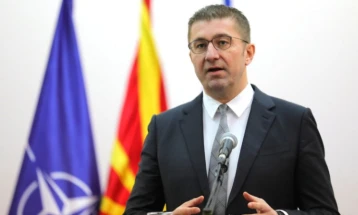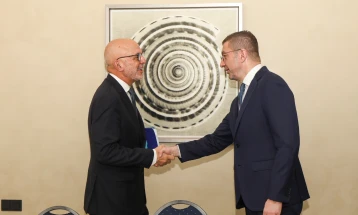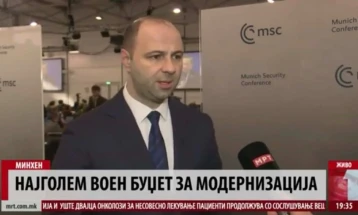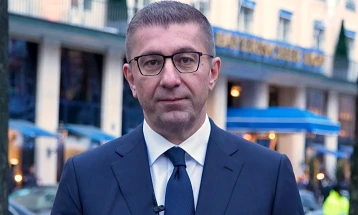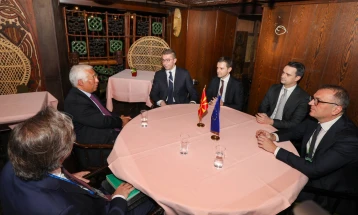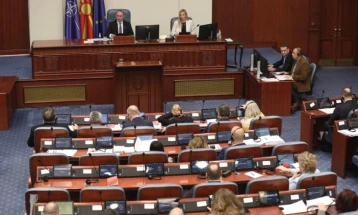Extremely important that EU talks with North Macedonia start in December, Linhart tells MIA
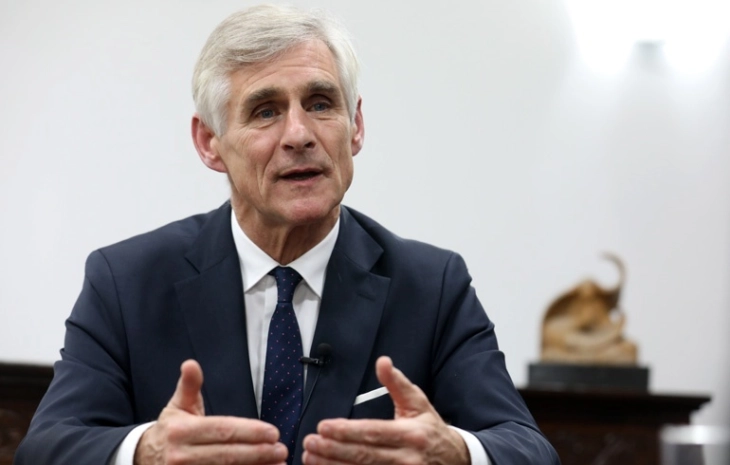
Skopje, 20 November 2021 (MIA) — The European Union’s integration of the Western Balkan countries is of absolute importance for Austria; Europe wouldn’t be complete without the region, Austria’s Federal Minister for European and International Affairs Michael Linhart told MIA.
In the following interview, Linhart said it was extremely important that the negotiations for the country's membership in the European Union start as soon as possible — December — reaffirming Austria’s support for North Macedonia on its EU path.
Mr. Linhart, thank you for doing this interview with MIA. This is your first visit to Skopje in your capacity as Federal Minister of Foreign Affairs. What messages did you convey to your interlocutors in Skopje regarding EU’s enlargement with Western Balkan countries?
This is one of my first visits to the region as foreign minister. I was before in Bosnia-Herzegovina and I insisted to come as fast as possible to North Macedonia and then to Albania, because this is one of our priorities in Austria, of our foreign policy. The message is of course that the enlargement process and membership of the countries of the Western Balkans is for us absolutely important. Europe is not complete as long as countries of the Western Balkans are not members of the European Union. So this was the message I gave in Sarajevo but also the message in all my discussions here in Skopje.
What is Austria’s position regarding the Bulgarian veto to North Macedonia’s opening of EU negotiations. Is Sofia’s policy undermining EU’s credibility and encouraging Euroscepticism?
It is extremely important to open the negotiations for the accession to the European Union as fast as possible, to start them now in December. I think everything is ready, the last country report by the Commission was absolutely positive for North Macedonia, so I think there is no absolutely reason to wait any further and we have to go into these negotiations now in December. It is a window of opportunity for both sides – for North Macedonia but also for the European Union. This is our message towards Skopje but also towards Brussels.
Before taking office as foreign minister, you were Austria’s ambassador to Paris. When EU enlargement is discussed, it is oftentimes mentioned that Paris has reservations on the matter. What is your impression about this French position?
We have continuous discussions in the European Union regarding the enlargement process but we are now in a situation where we all think that enlargement is necessary, that there is no alternative for Europe than to go into this enlargement, that there is no alternative for Europe to have the Western Balkans region as member of the European Union, and I have seen this position in Paris as well.
Is there concern in the EU that if it doesn’t accelerate the integration process of the Western Balkans, the region might fall under the influence of other global players, such as Russia, China, Turkey?
The reality is that the Western Balkans is in Europe, in the middle of Europe. It is not on the sides but in the courtyard of Europe. So I see no alternative for these countries of the Western Balkans than becoming members of the European Union. This is their perspective and future and I simply don’t see any alternative to that. This is what we are working for, these are the efforts that we have to make all together, with the aim of having them as members of the European Union.
In your first address to the National Council of Austria last month, you called for “a strong EU”. To what extent is Bulgaria’s treatment of North Macedonia and current developments in Hungary and Poland undermining the strong EU and its unity?
I have never talked of different kinds of Europe, first-class or second-class members of Europe, we need to have strong Europe based on our western values, Europe is a project in continuous development and we will all work together for this project and the Western Balkans is part of this project. The values and cultures of these countries in the region will have a positive contribution to the future of Europe. This is why I am also very happy that we managed to have the countries of the Western Balkans participating in the discussions on the future of Europe. We have to develop our common Europe all together, with the countries of the Western Balkans as well, but also all partners in the European Union. We have to continue this discussion, we have to continue to develop this project of Europe.
In what way and how much could Austria help North Macedonia during its EU accession process?
We are strong partners, we have great friendship with North Macedonia, we have a long common history and through that, we also have great understanding of what is going on in the Western Balkans. This is the contribution we can give in this whole process. In many situations we can explain the Western Balkans but also give the support to the countries of the Western Balkans in explaining Europe. This is extremely important and we are trying to give more Europe to the Western Balkans beside the accession process. This is extremely important, especially for the young people, to tell them what is Europe, where is Europe, our values, our common home. We have to explain it and we have to accompany these countries with these issues.
From 2003 until 2007 you served as managing director of the Austrian Development Agency (ADA). What are the Agency’s objectives and could ADA also finance and provide assistance to projects in North Macedonia?
The main aim of the Austrian Development Agency is to fight poverty in developing countries, to contribute to peace, social development and so on. North Macedonia was a priority country until 2010 but with its development and especially the negotiations on EU accession, which should start now, you are already in another position where you are no longer a priority country, but we have other financing methods within the European Union which are going to contribute to the support for the country on its way to Europe. It is no longer the development funds but the European funds that will contribute to development.
The world has been hit by the COVID-19 pandemic over the past two years. What is the epidemiological situation in Austria at the moment and what kind of measures are being taken?
We are all hit quite strongly by this pandemic and it’s always up and down. The infection figures are going up in Austria again, we have the vaccination where we are somewhere in the European average, but we can do better and be even more vaccinated and our efforts have to go in that direction. At the moment we think we have to encourage people to get vaccinated. At the moment we have measures where people who are not vaccinated cannot have the same freedom as those who are vaccinated and we have seen that this has a very strong result in the readiness of people to go for vaccination. Only last week we had some 130,000 people who went for vaccination and I think this is the boost that we need. We also see that vaccinated people are less affected by the infection. We don’t see them occupying the intensive care in hospitals. So the encouragement of getting more vaccinated people is the right way and we are concentrating our efforts in that direction.
What kind of entry conditions has Austria introduced according to the anti-Covid measures?
For people from North Macedonia it is possible to enter Austria if you are vaccinated, recovered, or you have a valid PCR test. If you don’t have one of the three conditions, then you have to go into quarantine, and after five days you can come out of the quarantine with a negative PCR test. Otherwise, you have to stay 10 days in quarantine.
Finally, what is your message to the Macedonian citizens regarding North Macedonia’s European perspective?
We are convinced that North Macedonia is ready for the negotiation process, North Macedonia is part of Europe and the aim has to be that North Macedonia will be a member of the European Union. North Macedonia has to be a member of the EU, this is our conviction and I am sure that we will reach this aim all together with efforts that have to come from both sides, but also with our full support.
Sashko Panajotov
Video: Andrej Brankovikj
